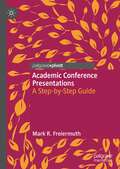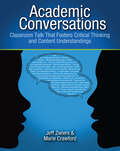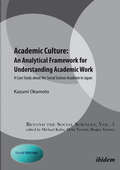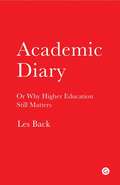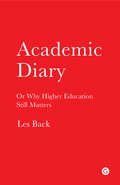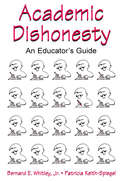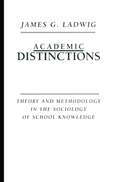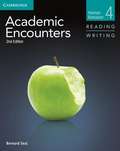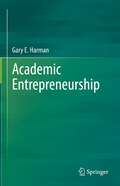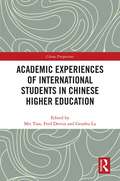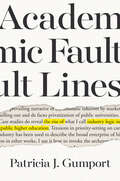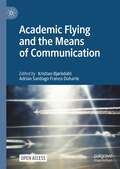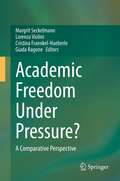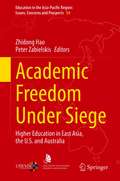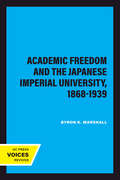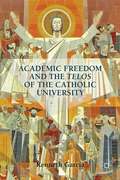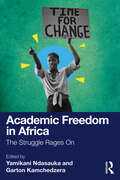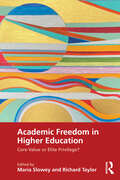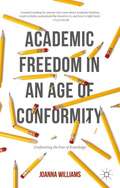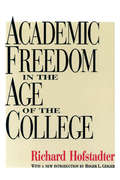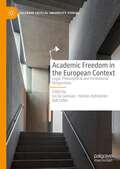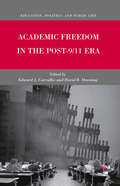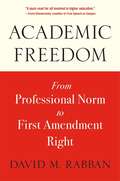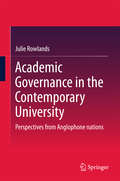- Table View
- List View
Academic Conference Presentations: A Step-by-Step Guide
by Mark R. FreiermuthThis book provides a step-by-step journey to giving a successful academic conference presentation, taking readers through all of the potential steps along the way—from the initial idea and the abstract submission all the way up to the presentation itself. Drawing on the author's own experiences, the book highlights good and bad practices while explaining each introduced feature in a very accessible style. It provides tips on a wide range of issues such as writing up an abstract, choosing the right conference, negotiating group presentations, giving a poster presentation, what to include in a good presentation, conference proceedings and presenting at virtual or hybrid events. This book will be of particular interest to graduate students, early-career researchers and non-native speakers of English, as well as students and scholars who are interested in English for Academic Purposes, Applied Linguistics, Communication Studies and generally speaking, most of the Social Sciences. With that said, because of the book’s theme, many of the principles included within will appeal to broad spectrum of academic disciplines.
Academic Conversations: Classroom Talk that Fosters Critical Thinking and Content Understandings
by Jeff Zwiers Marie CrawfordConversing with others has given insights to different perspectives, helped build ideas, and solve problems. Academic conversations push students to think and learn in lasting ways. Academic conversations are back-and-forth dialogues in which students focus on a topic and explore it by building, challenging, and negotiating relevant ideas. In Academic Conversations: Classroom Talk that Fosters Critical Thinking and Content Understandings authors Jeff Zwiers and Marie Crawford address the challenges teachers face when trying to bring thoughtful, respectful, and focused conversations into the classroom. They identify five core communications skills needed to help students hold productive academic conversation across content areas: Elaborating and Clarifying Supporting Ideas with Evidence Building On and/or Challenging Ideas Paraphrasing Synthesizing This book shows teachers how to weave the cultivation of academic conversation skills and conversations into current teaching approaches. More specifically, it describes how to use conversations to build the following: Academic vocabulary and grammar Critical thinking skills such as persuasion, interpretation, consideration of multiple perspectives, evaluation, and application Literacy skills such as questioning, predicting, connecting to prior knowledge, and summarizing An academic classroom environment brimming with respect for others' ideas, equity of voice, engagement, and mutual support The ideas in this book stem from many hours of classroom practice, research, and video analysis across grade levels and content areas. Readers will find numerous practical activities for working on each conversation skill, crafting conversation-worthy tasks, and using conversations to teach and assess. Academic Conversations offers an in-depth approach to helping students develop into the future parents, teachers, and leaders who will collaborate to build a better world.
Academic Culture: A Case Study about the Social Science Academe in Japan (Beyond The Social Sciences Ser. #5)
by Kazumi OkamotoThat we live in a world ruled and confused by cultural diversity has become common sense. The social sciences gave birth to a new theoretical paradigm, the creation of cultural theories. Since then, social science theorizing applies to any social phenomenon across the world exploring cultural diversities in any social practice—except the social sciences and how they create knowledge, which is off limits. Social science theorizing seemingly assumes that creating knowledge does not know such diversities. In this book, Kazumi Okamoto develops analytical tools to study academic culture, analyze how social sciences create and distribute knowledge, and the influence the academic environment has on knowledge production. She uses the academy in Japan as a case study of how social scientists interpret academic practices and how they are affected by their academic environment. Studying Japanese academic culture, she reveals that academic practices and the academic environment in Japan show much less diversity than cultural theories tend to presuppose.
Academic Diary: Or Why Higher Education Still Matters
by Les BackIs a university education still relevant? What are the forces that threaten it? Should academics ever be allowed near Twitter? In Academic Diary, Les Back has chronicled three decades of his academic career, turning his sharp and often satirical eye to the everyday aspects of life on campus and the larger forces that are reshaping it. Presented as a collection of entries from a single academic year, the diary moves from the local to the global, from PowerPoint to the halls of power. With entries like "Ivory Towers" and "The Library Angel," these smart, humorous, and sometimes absurd campus tales not only demystify the opaque rituals of scholarship but also offer a personal perspective on the far-reaching issues of university life.Commenting on topics that range from the impact of commercialization and fee increases to measurement and auditing research, the diary offers a critical analysis of higher education today. At the same time, it is a passionate argument for the life of the mind, the importance of collaborative thinking, and the reasons that scholarship and writing are still vital for making sense of our troubled and divided world.
Academic Diary: Or Why Higher Education Still Matters (Goldsmiths Press Ser.)
by Les BackSharp and witty observations of academic life that range from the local to the global, from PowerPoint to the halls of power.Is a university education still relevant? What are the forces that threaten it? Should academics ever be allowed near Twitter? In Academic Diary, Les Back has chronicled three decades of his academic career, turning his sharp and often satirical eye to the everyday aspects of life on campus and the larger forces that are reshaping it. Presented as a collection of entries from a single academic year, the diary moves from the local to the global, from PowerPoint to the halls of power. With entries like “Ivory Towers” and “The Library Angel,” these smart, humorous, and sometimes absurd campus tales not only demystify the opaque rituals of scholarship but also offer a personal perspective on the far-reaching issues of university life.Commenting on topics that range from the impact of commercialization and fee increases to measurement and auditing research, the diary offers a critical analysis of higher education today. At the same time, it is a passionate argument for the life of the mind, the importance of collaborative thinking, and the reasons that scholarship and writing are still vital for making sense of our troubled and divided world.
Academic Dishonesty: An Educator's Guide
by Patricia Keith-Spiegel Bernard E. Whitley, Jr.This book, written by two nationally renowned scholars in the area of ethics in higher education, is intended to help teachers and administrators understand and handle problems of academic dishonesty. Chock-full of practical advice, the book is divided into three parts. Part I reviews the existing published literature about academic dishonesty among college and university students and how faculty members respond to the problem. Part II presents practical advice designed to help college and university instructors and administrators deal proactively and effectively with academic dishonesty. Part III considers the broader question of academic integrity as a system-wide issue within institutions of higher education.
Academic Distinctions: Theory and Methodology in the Sociology of School Knowledge
by James G. LadwigAcademic Distinctions is the most sustained and rigorous critique of radical sociology of school knowledge and its major figures to date. Using a variety of theoretical lenses to analyze and reconstitute the field--structuralist, poststructuralist and feminist--James Ladwig documents how the so-called "new sociologists of education" lost their theoretical way and failed to realize their educational goals.
Academic Encounters, Level 4: Human Behavior (2nd Edition)
by Bernard SealThe Academic Encounters 2nd edition series uses a sustained content approach to teach skills necessary for taking academic courses in English. There are two books for each content area. Academic Encounters Level 4 Reading and Writing Human Behavior engages students with authentic academic readings from college textbooks, photos, and charts on stimulating topics from the fields of psychology and communications. Topics include health, intelligence, and interpersonal relationships. Students develop important skills such as skimming, reading for the main idea, reading for speed, understanding vocabulary in context, summarizing, and note-taking. By completing writing assignments, students build academic writing skills and incorporate what they have learned. The topics correspond with those in Academic Encounters Level 4 Listening and Speaking Human Behavior. The books may be used independently or together.
Academic Entrepreneurship
by Gary E. HarmanThis book explores different aspects of entrepreneurship from both an academic and a commercial point of view. The first chapter the university culture is considered. The nature of the technology or service is important. Some technologies are adaptive, in that they are developing products that are already in the marketplace, and these fit easily in academic institutions. Other technologies are disruptive and new products must be developed. These fit less easily into university structures since a commercial entity is required. Chapter 4 considers the important requirements of conflict of interest (COI). Either the university culture or COI can hinder or aid entrepreneurial faculty. The second chapter deals with the reasons why an individual faculty might wish to become entrepreneurial. In many cases, a faculty member wants to see their technology in practice and not just a publication in a scientific journal. If a technology is disruptive, then a commercial entity is probably essential. If so, then funding must be obtained. There are “valleys of death” (1) where scientific discoveries to useful products and (2) the development, production and marketing of a commercially viable product. Chapter 6 deals specifically with methods of funding start-up companies. Chapter 3 describes several innovative programs in biology. These include genetic approaches, plant management systems and the author’s own program that deals with microbial approaches to sustainable agriculture. Chapter 5 describes the crucial areas of agreements, contracts, regulatory affairs and patents. These legal documents are critical components of entrepreneurial efforts and must be understood and pursued correctly. Finally, this book could have been entitled “things I wish I had known when I first started commercial activities.” It is my hope that it can make the path of fledgling entrepreneurial smoother and more successful.
Academic Experiences of International Students in Chinese Higher Education (China Perspectives)
by Mei Tian Fred Dervin Genshu LuSince China proposed its “Belt and Road Initiative” in 2013 to boost its influence on international affairs and “cultivate international contacts who are friendly toward China”, the number of foreign students in China has surge exponentially. Yet the global political changes have added tensions and challenges to the education of international students. This book is one of the first works to discuss the educational experiences of international students in China. Using survey research and qualitative studies to study participants in degree-bearing and language programmes at regular universities and Sino-Foreign universities located in different parts of the country, the book covers a variety of topics across education, including international students’ intercultural experience, teacher–student classroom interaction, learning and teaching Chinese as a foreign language, academic adaptation and identity formation in higher educational contexts. This book is essential for researchers, practitioners and policy-makers of international student education in China. It can also benefit prospective international students considering pursuing higher education in China.
Academic Fault Lines: The Rise of Industry Logic in Public Higher Education
by Patricia J. GumportHow did public higher education become an industry? This unprecedented account reveals how campus leaders and faculty preserved the vitality and core values of public higher education despite changing resources and expectations.American public higher education is in crisis. After decades of public scrutiny over affordability, access, and quality, indictments of the institution as a whole abound. Campus leaders and faculty report a loss of public respect resulting from their alleged unresponsiveness to demands for change. But is this loss of confidence warranted? And how did we get to this point? In Academic Fault Lines, Patricia J. Gumport offers a compelling account of the profound shift in societal expectations for what public colleges and universities should be and do. She attributes these new attitudes to the ascendance of "industry logic"—the notion that higher education must prioritize serving the economy. Arguing that industry logic has had far-reaching effects, Gumport shows how this business-oriented mandate has prompted colleges to restructure for efficiency gains, adopt more corporate forms, develop deeper ties with industry, and mold academic programs in the interest of enhancing students' future employment prospects. She also explains how industry logic gained traction and momentum, altering what constitutes legitimacy for public higher education.Yet Gumport's narrative is by no means defeatist. Drawing on case studies of nine public colleges and universities, as well as more than 200 stakeholder interviews, Gumport's nuanced account conveys the successful efforts of leaders and educators to preserve and even strengthen fundamental public values such as educational access, knowledge advancement regardless of currency, and civic responsibility. Ultimately, Academic Fault Lines demonstrates how intrepid faculty and administrators engaged their communities both on and off campus, collaborating and inventing win-win scenarios to further public higher education's expanding legacy of service to all citizens while preserving its centrality to society and the world.
Academic Flying and the Means of Communication
by Kristian Bjørkdahl Adrian Santiago Franco DuharteThis open access book shines a light on how and why academic work became entwined with air travel, and what can be done to change academia’s flying habit. The starting point of the book is that flying is only one means of scholarly communication among many, and that the state of the planet now obliges us to shift to other means. How can the academic-as-globetrotter become a thing of the past? The chapters in this book respond to this call in three steps. It documents the consequences of academic flying, it investigates the issue of why academics fly, and it begins an effort to think through what can replace flying, and how. Finally, it confronts scholars and scientists, students, activists, research funders, university administrators, and others, with a call to translate this research into action.
Academic Freedom Under Pressure?: A Comparative Perspective
by Lorenza Violini Margrit Seckelmann Cristina Fraenkel-Haeberle Giada RagoneIs academic freedom threatened? The book examines current challenges to academic freedom in Europe, focusing mainly on Italy and Germany. The cases discussed demonstrate that research and teaching are under pressure in European democracies: in Hungary and Poland due to political constraints, in other countries due to societal expectations. Considering different interrelated aspects, the four parts of the book explore many real and potential threats to universities, scientific institutions and researchers, ranging from the European dimension of freedom of the arts and sciences to comparative analysis of emerging challenges to academic freedom against the backdrop of the COVID-19 pandemic. They highlight threats to university autonomy from the economic orientation of university governance, which emphasizes efficiency, competition, and external evaluation, and from new rules concerning trigger warnings, speech restrictions, and ethics commissions. Detailed study of these complex threats is intended to stimulate scholarly reflection and elicit serious discussion at European and national level. The volume contributes to the search for a new role of universities and scientific institutions and is addressed to academics and political stakeholders.
Academic Freedom Under Siege: Higher Education in East Asia, the U.S. and Australia (Education in the Asia-Pacific Region: Issues, Concerns and Prospects #54)
by Zhidong Hao Peter ZabielskisThis book argues that academic freedom in higher education in East Asia, the U.S. and Australia is under stress. Academic freedom means freedom to teach, research, and serve in multiple political and social roles based on professional principles. It is closely linked to shared governance, in which academics participate in and influence decision making in core academic concerns such as choosing new faculty, faculty promotion, tenure decisions and the approval of new academic programs.In different countries and regions, the duress confronting academic freedom may come from different directions, and the ability of faculty to share power can vary greatly. In authoritarian mainland China, it is mostly political and ideological controls that greatly affect academic freedom, and shared governance is very much limited. In semi-democracies like Hong Kong and Macau and democracies like Taiwan, Japan, South Korea, the U.S. and Australia, corporatization and commercialization have had great impact on both academic freedom and shared governance. The result is that the roles professors play within academia are continually being diminished and the academic profession is struggling to maintain its ground. Similar developments are also occurring in Europe. These developments should cause great concern to educators, researchers and policymakers everywhere. The authors collected here present attempts to learn from current practice in order to move policy into directions that will help protect higher education as a common good. This book highlights the importance of academic freedom and provides insights into the ways it is being infringed both by commercialization and corporatization on the one hand and political repression on the other. It vividly illustrates detailed case studies and empirical data that make it a compelling read.- Professor Ruth Hayhoe, University of Toronto, Canada Academic freedom is as important today as at any time in the last century. The authors point out the challenges that academic freedom faces on a global scale. The import of the book is in its comparative perspective steeped in data and analysis. Thoughtful. Cogent. Compelling. - Professor William G. Tierney and Professor Wilbur-Kieffer, University of Southern California, United States
Academic Freedom and the Japanese Imperial University, 1868-1939
by Byron K. MarshallByron K. Marshall offers here a dramatic study of the changing nature and limits of academic freedom in prewar Japan, from the Meiji Restoration to the eve of World War II.Meiji leaders founded Tokyo Imperial University in the late nineteenth century to provide their new government with necessary technical and theoretical knowledge. An academic elite, armed with Western learning, gradually emerged and wielded significant influence throughout the state. When some faculty members criticized the conduct of the Russo-Japanese War the government threatened dismissals. The faculty and administration banded together, forcing the government to back down. By 1939, however, this solidarity had eroded. The conventional explanation for this erosion has been the lack of a tradition of autonomy among prewar Japanese universities. Marshall argues instead that these later purges resulted from the university's 40-year fixation on institutional autonomy at the expense of academic freedom.Marshall's finely nuanced analysis is complemented by extensive use of quantitative, biographical, and archival sources.
Academic Freedom and the Telos of the Catholic University
by Kenneth GarciaThis book presents a theologically-grounded understanding of academic freedom that builds on, completes, and transforms the prevailing secular understanding. Academic freedom in the secular university, while rightly protecting scholars from external interference by ecclesiastical and political authorities, is constricting in practice because it tends to prohibit most scholars from exploring the relation of the finite world to the infinite, or God. In the Catholic university, true academic freedom means both the freedom of the scholar to pursue studies unencumbered by external interference, and freedom to pursue knowledge beyond the boundaries of specific academic disciplines toward an infinite horizon.
Academic Freedom in Africa: The Struggle Rages On
by Yamikani Ndasauka Garton KamchedzeraThis book leaves no stone unturned in its comprehensive examination of the complex challenges surrounding academic freedom in Africa.Drawing on diverse perspectives and methodologies, it delves into the historical, philosophical, legal, and socio-political dimensions shaping academic freedom across the continent. The authors grapple with colonial legacies, tensions between Western and African notions of intellectual liberty, government authoritarianism, and institutional constraints that hinder open discourse and the pursuit of knowledge. The book highlights systemic obstacles and promising avenues for progress through case studies, comparative analysis, and empirical research, such as constitutional reforms, scholar activism, and regional networks. This thought-provoking volume offers critical insights into the state of academic freedom in Africa, emphasising the necessity of supporting African voices and agencies in the quest for meaningful intellectual autonomy.Academic Freedom in Africa is an essential read for students, scholars, policymakers, and anyone concerned with the future of higher education and democracy on the continent.
Academic Freedom in Higher Education: Core Value or Elite Privilege?
by Richard Taylor Maria SloweyThis timely book explores the challenges facing universities and individual scholars through an examination of the history and theory underlying the concept of academic freedom.Freedom of speech is widely viewed as a central attribute of contemporary liberal democracies and within limits — differing opinions can be articulated in public without fear of reprisal. Academic freedom, long regarded as central to the idea of the university is, on the other hand, a right which must be earned through the acquisition of expert knowledge and the application of intellectual rigor in teaching and research. Both hard-won freedoms are argued by many to be under serious threat. The expert contributors to this book, from different global regions, examine both the importance of academic freedom and the severe threats universities face in this context in the twenty-first century. With its interdisciplinary perspective and cross-national emphasis, central issues in this text are illustrated through detailed examination of case studies and consideration of wider developments in the academy. Adopting a longue duree approach, rather than discussing the details of fast moving, controversies, the analyses offer insights for an educated public about an issue of pressing, contemporary significance.This book will be of interest to researchers, policy makers, staff and students across higher education and to members of the general public, who are concerned about these important and contested matters.
Academic Freedom in an Age of Conformity: Confronting The Fear Of Knowledge (Palgrave Critical University Studies)
by Joanna WilliamsAcademic freedom is increasingly being threatened by a stifling culture of conformity in higher education that is restricting individual academics, the freedom of academic thought and the progress of knowledge – the very foundations upon which academia and universities are built. Once, scholars demanded academic freedom to critique existing knowledge and to pursue new truths. Today, while fondness for the rhetoric of academic freedom remains, it is increasingly criticised as an outdated and elitist concept by students and lecturers alike and called into question by a number of political and intellectual trends such as feminism, critical theory and identity politics. This provocative and compelling book traces the demise of academic freedom within the context of changing ideas about the purpose of the university and the nature of knowledge. The book argues that a challenge to this culture of conformity and censorship and a defence of academic free speech are needed for critique to be possible and for the intellectual project of evaluating existing knowledge and proposing new knowledge to be meaningful. This book is that challenge and a passionate call to arms for the power of academic thought today.
Academic Freedom in the Age of the College (Foundations Of Higher Education Ser.)
by Richard HofstadterWhen this classic volume first appeared, academic freedom was a crucially important issue. It is equally so today. Hofstadter approaches the topic historically, showing how events from various historical epochs expose the degree of freedom in academic institutions. The volume exemplifies Richard Hofstader's qualities as a historian as well as his characteristic narrative ability. Hofstadter first describes the medieval university and how its political independence evolved from its status as a corporate body, establishing a precedent for intellectual freedom that has been a measuring rod ever since. He shows how all intellectual discourse became polarized with the onset of the Reformation. The gradual spread of the Moderate Enlightenment in the colonies led to a major advance for intellectual freedom. But with the beginning of the nineteenth century the rise of denominationalism in both new and established colleges reversed the progress, and the secularization of learning became engulfed by a tidal wave of intensifying piety. Roger L. Geiger's extensive new introduction evaluates Hofstadter's career as a historian and political theorist, his interest in academic freedom, and the continuing significance of Academic Freedom in the Age of the College. While most works about higher education treat the subject only as an agent of social economic mobility, Academic Freedom in the Age of the College is an enduring counterweight to such histories as it examines a more pressing issue: the fact that colleges and universities, at their best, should foster ideas at the frontiers of knowledge and understanding. This classic text will be invaluable to educators, university administrators, sociologist, and historians.
Academic Freedom in the European Context: Legal, Philosophical and Institutional Perspectives (Palgrave Critical University Studies)
by Ralf Lüfter Ivo De Gennaro Hannes HofmeisterThis book explores the concept of academic freedom from a European vantage point. Drawing on both philosophical and legal perspectives, the editors and contributors analyse the concept of academic freedom within the present institutional setting. Academic freedom has long been considered a natural part of higher education, but as the world enters the digital age, a renewed understanding of its role and the threats it must face is required. The authors question the purpose of science without freedom, and subsequently the purpose of political communities without free science. Although the book uses European case studies to answer these questions, it undoubtedly has global relevance: what would be left of the present notion of the ‘global world’ were we to conceive of its character without modern science? This book calls for a critical re-examination of the academic community and its own understanding of the sources, conditions and aims of scientific practice.
Academic Freedom in the Post-9/11 Era (Education, Politics and Public Life)
by Edward J. Carvalho David B. DowningThis timely collection features an impressive assembly of the nation's leading intellectuals, addressing some of the most urgent issues facing higher education in the United States today.
Academic Freedom: An Essay In Definition
by Russell KirkAs defined by the distinguished editor, Mr. W. T. Couch, "Academic Freedom is the principle designed to protect the teacher from hazards that tend to prevent him from meeting his obligations in the pursuit of truth." In this book, the author discusses the concept of academic freedom drawing from the writings and quotes of eminent philosophers and men of thought.
Academic Freedom: From Professional Norm to First Amendment Right
by David M. Rabban“The best kind of scholarship—deeply researched and immensely useful. Wherever you stand on issues of free speech and academic freedom, you will learn from this book.” —Michael Roth, President of Wesleyan University and author of Safe Enough SpacesA definitive interpretation of academic freedom as a First Amendment right, drawing on a comprehensive survey of legal cases.Is academic freedom a First Amendment right? Many think so, yet its relationship to free speech as guaranteed by the Constitution is anything but straightforward. David Rabban examines the extensive case law addressing academic freedom and free speech at American universities, developing a robust theory of academic freedom as a distinctive subset of First Amendment law.In subsuming academic freedom under the First Amendment, Rabban emphasizes the societal value of the contribution to knowledge made by the expert speech of professors, the classic justification for academic freedom in the influential 1915 Declaration of the American Association of University Professors (AAUP). Any indication that professors might be disciplined because people without academic training disagree with their scholarly views would undermine confidence in the integrity of their work and therefore their ability to perform this vital function on behalf of the public. Rabban argues that academic freedom fosters two central First Amendment values recognized by courts in a wide range of contexts: the production and dissemination of knowledge and the contribution of free expression to democratic citizenship.The First Amendment right of academic freedom applies most directly to professors, but it also plausibly extends to the educational decisions of universities and to students’ learning interests. More broadly, this vision of academic freedom can guide in developing additional distinctive First Amendment rights to protect the expert expression of journalists, librarians, museum curators, and other professionals. At a time when academic freedom is under attack from many directions, Academic Freedom proposes a theoretically satisfying and practically useful guide to its meaning as a First Amendment right.
Academic Governance in the Contemporary University: Perspectives from Anglophone nations
by Julie RowlandsThis book addresses three central questions in contemporary university governance: (1) How and why has academic governance in Anglophone nations changed in recent years and what impact have these changes had on current practices? (2) How do power relations within universities affect decisions about teaching and research and what are the implications for academic voices? (3) How can those involved in university governance and management improve academic governance processes and outcomes and why is it important that they do so? The book explores these issues in clear, concise and accessible language that will appeal to higher education researchers and governance practitioners alike. It draws on extensive empirical data from key national systems in the Anglophone world but goes beyond the simply descriptive to analyse and explain.
